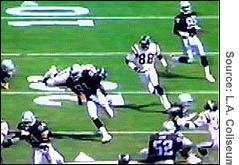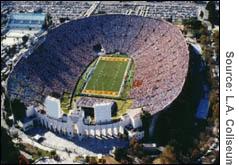|
NFL: No Football in LA
|
 |
September 7, 2001: 10:26 a.m. ET
League, networks, city better off from NFL's absence from No. 2 market
A weekly column by staff writer Chris Isidore
|
NEW YORK (CNNfn) - Football returns this weekend for the 94 percent of the country that doesn't live in or near the nation's second largest city.
And that's probably a good thing for both the National Football League and for the citizens of Los Angeles, even those who are football fans.
It seems incredible that the league that television built could be missing from Tinseltown for the seventh straight season. But the city's last taste of football taught the league and the networks that feed it that bad football in Los Angeles is worse than no football at all.
| |

|
|
The Raiders, shown here in their Los Angeles home, are one of two teams that left the market after the 1994 season. | |
"If the team is competitive, the Los Angeles fans will pay top dollar, make going to the games an event," said Marc Ganis, president of sports consulting firm Sportscorp Ltd. "But they won't support a loser. There are too many alternative activities can be conducted in the fall. You can go to beach. You can't do that in Chicago."
The combined effects of the league's revenue sharing and television blackout rules have unintentionally conspired to make Los Angeles the land that football forgot. That's because the size of the market doesn't matter nearly as much as in the case of other sports, which depend on a large fan base to draw paying customers and win lucrative local television contracts.
In the NFL, teams share television rights payments equally, which is the source of most of their revenue. They also share gate receipts.
Only such secondary sources of revenue such as stadium advertising, luxury box revenue and the like stay with the team. So a sweet stadium deal in a smaller market is far better than a "bad" deal in what is arguably the media capital of the world.
The television networks aren't screaming to get a team in Los Angeles because they are better off without the relatively unpopular teams that played there before. With television blackout rules, if a team doesn't sell out its seats two days before a home game, the game isn't aired in the market and the network which had rights to the game can't broadcast another game during the same time.

|
|
|
Sellouts like this were rare when NFL teams played in Los Angeles. | |
The Raiders and Rams were both only selling about half their available seats before they left town, preventing the networks from showing most of their home games and limiting them to show one out-of-town game on Sundays instead of a doubleheader.
The average NFL ratings in the Los Angeles market are only slightly below the league's nationwide ratings the last two years, where as before the Rams and Raiders left, they were slightly above the national average. But with the networks getting to show two games each week instead of just one due to blackouts, they get far more commercial time to sell in the market.
"Would a strong team in Los Angeles benefit whichever package? Certainly. Does just any team in Los Angeles help? The impact is clearly less," said Lou D'Ermilio, spokesman for Fox Sports.
Click here for CNNSI.com's pro football coverage
Even die-hard football fans, who weren't that committed to the Raiders or Rams anyway, are arguably better off now without a team, since without blackouts they get their choice of the league's best match-ups each week.
When Los Angeles lost out to Houston in 1999 for the expansion franchise that will start play next season, there was talk that Los Angeles would attract another team to start playing there before a football was thrown, kicked or caught in Houston. That clearly didn't happen, and it may be some time, if ever, before Los Angeles woos away another team.
One key reason Los Angeles did not get the expansion franchise is because the city did not give the league the stadium deal it was seeking. City officials pushed to have the new team play at the Los Angeles Coliseum, an aging structure whose landmark status makes changes difficult and expensive.
Ganis says another franchise could move to Los Angeles and build an ideal stadium for itself, saving the team from turning to city officials not willing to build the stadium it wants. Even the most expensive stadium wouldn't cost more than the $700 million expansion franchise fee paid by the Houston owners.
A relocated franchise also has a better shot at putting together a winning record quickly needed to win over the Southern California fans. Three of the last four teams to play in the Super Bowl have relocated since 1995.
"If you're a relocated franchise you can decide to put a stadium anywhere. It changes the dynamic. It changes the whole economic equation," said Ganis, who predicts a team will be there by the end of the decade. But he said won't happen if the city continues to push to have games played at the Coliseum.
"No team will relocated unless there is an appropriate stadium deal in place," he said. "That's where L.A. has been lacking."
Hit and Run - more highlights from the business of sports
Still, with Los Angeles sitting there without a franchise, each team that might consider a move can use the threat of a move to Los Angeles as leverage to get a deal for a new stadium, renovations and/or a new lease from their current hometown, paid for by taxpayers and politicians who believe they need to hang onto an NFL team to be considered a major city.
Los Angeles officials, whatever their faults, don't harbor that delusion.
So as the new season kicks off, the chance of Los Angeles getting a team seems about as likely as Charlie Brown getting to kick the football being held by Lucy. But that may make Los Angeles the only sure winner in the league. 
|
|
|
|
|
 |

|

